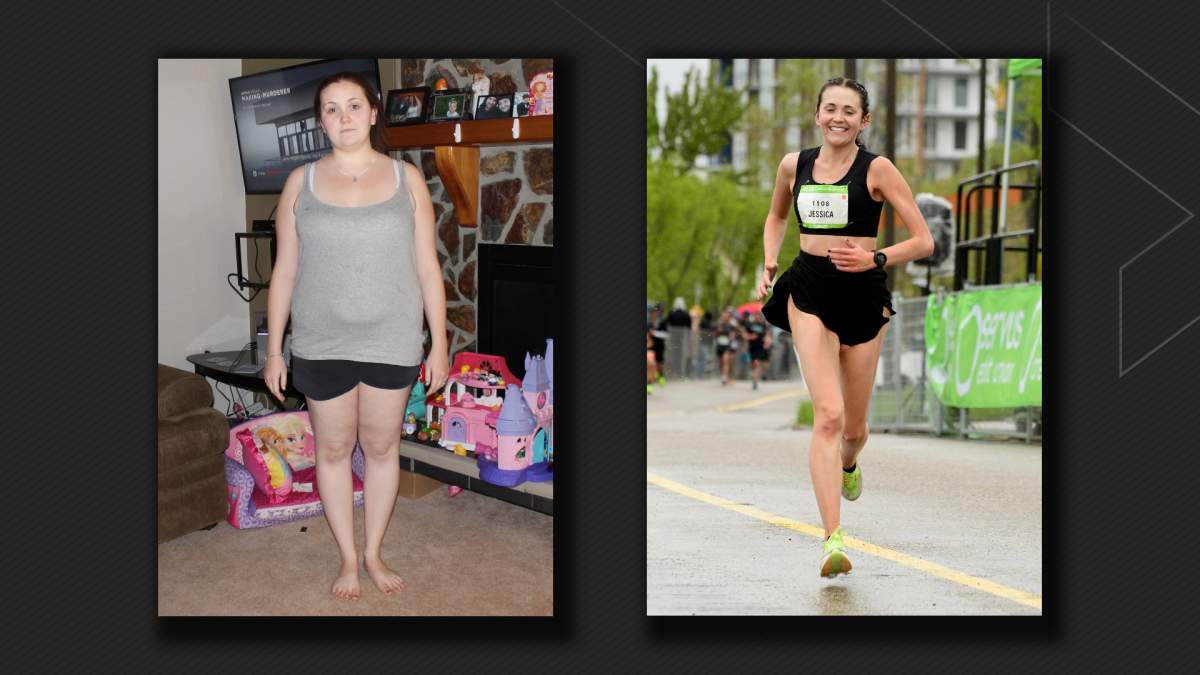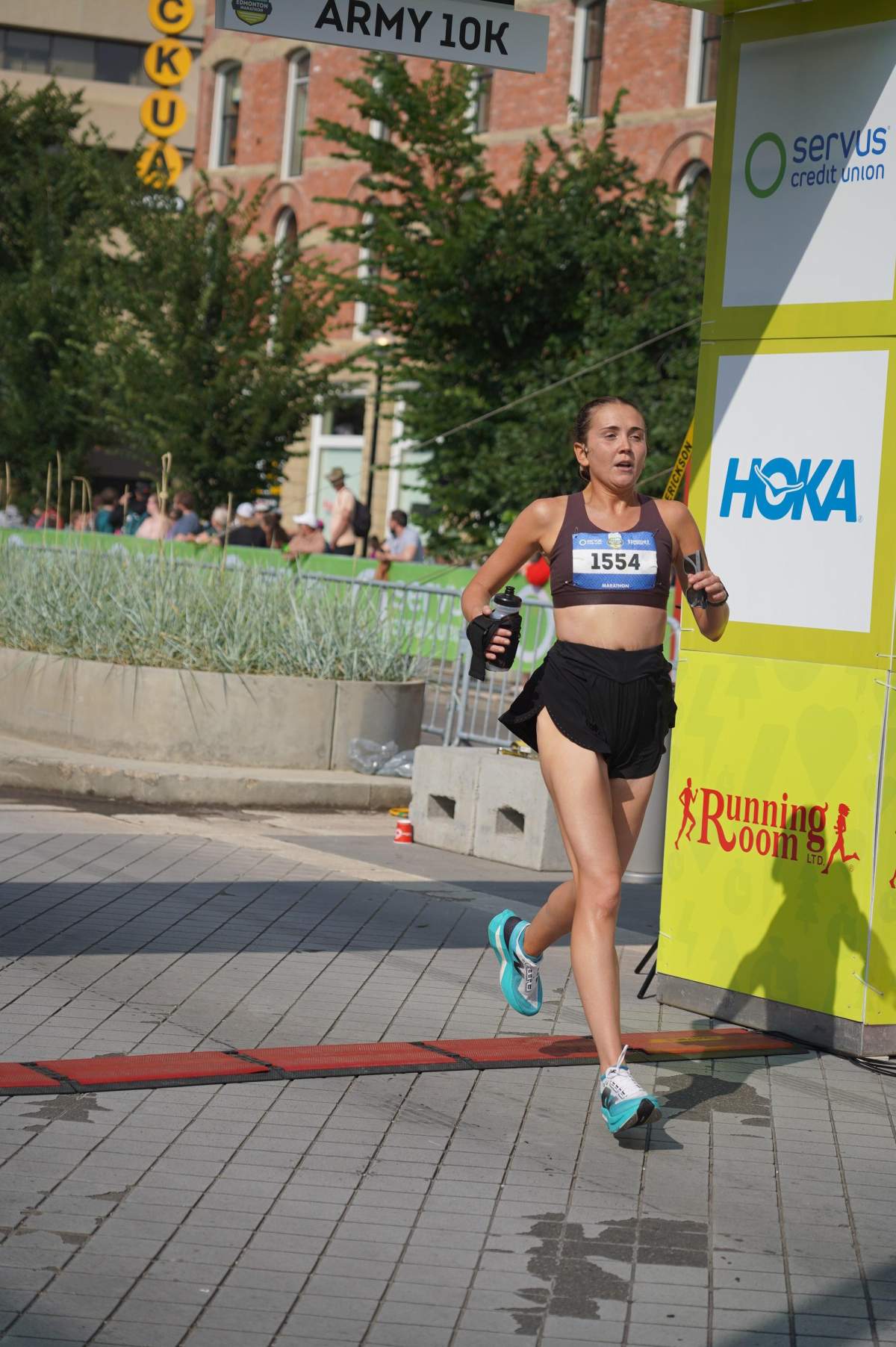Jessica McBride, pushing 300 pounds after the birth of her third child in 2015, was overweight and had to change.

“I realized that I needed to be around for my three children and to do that I had to prioritize my own health.
“I decided that I needed to lose weight.”
McBride dropped about half of her body weight in a stunning half a year, down to around 140 pounds, by changing her diet.
She said she did some exercise like high-intensity interval training (HIIT) but didn’t get into significant cardiovascular exercise during those six months.
“It gave me the confidence to move forward and to try to do other things with my life.”
After dropping the weight, she took up running.
“I felt really silly when I started,” the 33-year-old St. Albert, Alta., mother said.
“I felt like the whole world was staring at me and how not good at this I was.”
Building up physical endurance was one thing, but there was an even bigger mental hurdle to overcome: McBride battled childhood insecurities along the way, explaining she had a gym teacher who belittled her running in front of the class.
“I would not run after that because I internalized what that adult had told me — was that I was not a runner. And I believe that until I was an adult and I decided, no, I am going to challenge this.”
Her dad had done triathlons and her mom was a long-distance runner, so McBride followed in their footsteps first with the weight loss, and then with race training.

Get breaking National news
“I’m very fortunate that I am single-minded. I am my mother’s child that way,” McBride said. “I was able to get that done pretty quickly.”
Step by step, her strength grew. She did a couch-to-5K program and progressed from there.
“I have these three little girls that I have to model for, for the rest of my life. And do I want them to believe that they have to listen to the opinions of other people to form their idea of who they are? I didn’t want that for them, which means I have to lead by example.”
“I think everyone, in different areas of their lives, they allow other people to tell them who they are — for better or for worse. And I think we need to challenge those things.”
One year after she picked up running, McBride took part in her first marathon in Red Deer. A month afterwards, she ran in Banff, and later that year, in a marathon in Edmonton.
5Ks were a walk in the park and a full marathon was fun but McBride wanted more — which is how she ended up in the world of ultramarathon running.
“I decided there has to be more, because what I love about long-distance running is that there is no limit except what you put on it.”
She signed up for the Whistler50 and a mere four months after her first marathon, took on the 80-kilometre ultramarathon. Then, she upped it to 100 kilometres.
“The 100K is that sweet spot where you can open it up. You can still keep it in the four-minute kilometres and have a great time and not necessarily wreck yourself — maybe you will. You never know,” McBride said with a laugh.
She cautioned one must do their research on nutrition and knowing their body in a race, and recommends training and conditioning their body for about two years before attempting a 100K race.
As a now mother of four, she said there is peace in knowing her ability to run long distances is something she has achieved all by herself — for herself.
“I find that that’s very helpful for me — not just as a mom, but like as a woman today. There’s a lot of areas where women are told, OK, well, you’re not supposed to take up space here…. I find that running is really helpful that way.”
So how does a busy mom do it?
“You marry an understanding man is how you do it,” she laughed, saying her partner is an active parent who keeps the family life going (she has had a son since she began running) when she has a busy training schedule. Her mom also helps out with the kids so McBride has the time for things like long runs, which can take hours to complete.
“We have great family support.”
Now, she’s headed to her first global competition. Next month, McBride will represent Canada at the International Association of Ultrarunners‘ 100 km World Championship.
It’s in Bangalore, a tropical city in southern India where the average daytime temperature in December ranges from a high of 27 C to a low of 16 C, plus a relative humidity of around 55 per cent.
“She’s going to be warm,” McBride laughed.
She’s a member of the Association of Canadian Ultramarathon Runners and said they’ve provided her with protocols for acclimatizing to a hot climate, including three weeks of intense sauna sessions followed by running indoors in winter gear to help simulate the environment and increase blood hemoglobin.
“It’ll be into the sauna, on the treadmill, into the sauna, on the treadmill. It’ll be grand. It’ll be a great time,” she joked.
Crossing the finish line next month will be a bucket-list moment for McBride, who admitted she is competitive and has many goals.
“I promised myself before I was 40, I would run for my country. And I have made it. I will be 33 years old.”
There isn’t anything special to it and anyone who is healthy and able-bodied can run if they put their mind to it, McBride said.
“It just takes the belief in yourself and I think that that’s what a lot of people lack. They don’t believe that they can do it and that’s why they don’t ever pursue doing it. And obviously there’s people who won’t be interested in doing it. And God bless them, they’re going to have less injuries than me,” she laughed.
“But I think that self-belief is a huge thing for people.”
The Association of Canadian Ultramarathoners has a lot of information available to anyone who is interested in attempting longer distances, she said.
“If anyone is interested in getting into it, I believe they can. I give them my vote of confidence that they can do it if they put in the work.”

















Comments
Want to discuss? Please read our Commenting Policy first.